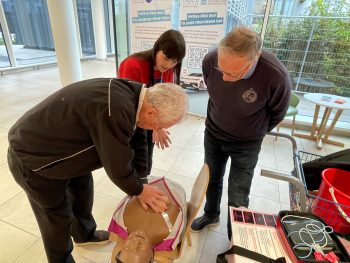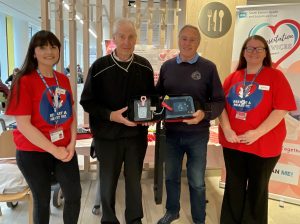
The South Eastern Trust held an information stand in the Ulster Hospital to mark Restart a Heart Day, increasing public awareness about Cardiopulmonary Resuscitation (CPR) the use of defibrillators and teaching crucial life-saving skills.
Restart a Heart Day is a global initiative aimed at improving survival rates following cardiac arrest by promoting CPR awareness and training among the public.
Every year in Northern Ireland there are approximately 1,500 out of hospital cardiac arrests, where CPR is attempted. The survival rate here remains less than 1 in 10 so it is vital to raise awareness about defibrillators which are widely available across the Region, although unfortunately they were only used in 8.5 per cent of cardiac arrests.
A massive 61 per cent of people here say they aren’t confident enough to use one, although they are simple to operate and if deployed within 3-5 minutes, can increase survival rates by as much as 50-70 per cent.
Stopping by the stand, First Aider, Gordon Buckley said, “I think it is important that everybody knows how to perform CPR. I would hate to be in a situation where something happened at a football match, for example and not be able to deal with it. I would also like to think that if something happened to me, someone nearby would be able to step in and help. That is why raising awareness of CPR is so important.”
Resuscitation Officer, Holly Grant, added, “Restart a Heart Day is a worldwide initiative that encourages and promotes CPR and teaches people vital life-saving techniques such as chest compressions, rescue breathing and using a defibrillator.
“Approximately 80 percent of cardiac arrests happen in community settings, not in hospital. The more people we can train in CPR, the more lives can be saved. It is so important that everyone knows what to do in an emergency.”
Explaining the process of CPR, Holly commented, “It is important to open the airway using the head-tilt, chin-lift technique to move the tongue out of the way. Check for breathing, look for the chest rising, listen for sounds and feel for breath on your cheek.
“If the person is not breathing normally or you are unsure, start CPR immediately. Place your hands in the centre of the chest, interlock your fingers and begin compressions, hard and fast.
“It is vital that we educate as many people as possible about CPR, it could ultimately save a life.”




